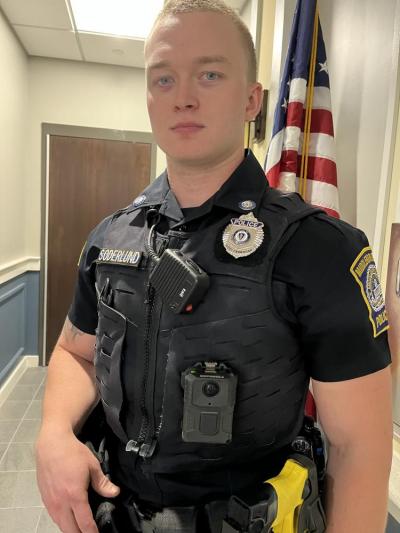Body cams provide transparency for Middleboro, Lakeville police
The police departments in both Lakeville and Middleborough have each launched body camera programs recently, in hopes of increasing accountability to the public.
Every officer at each department is now outfitted with a camera, thanks to these two programs. But launching them was not an easy feat for the two departments, particularly because so few agencies in Massachusetts similar programs up and running.
“The biggest obstacle was the purchase of the body cameras,” Middleborough police chief Joseph Perkins said. "I don't ever want anyone to ever question what took place… I think having it on video only supports and corroborates the officer and adds to the credibility of a police officer.”
Middleborough’s chief of police said the department started working with the town’s board of selectmen around three years ago on the program, and officially launched it on Jan. 1.
The town bought around 50 Motorola body cameras for the initiative.
The court closings during the early part of the pandemic lead to a budget surplus at the police department, because overtime costs were cut, according to Perkins. The select board agreed to use that extra money to begin funding the program.
“The camera itself isn’t very expensive,” Chief Joseph Perkins said. “They're about 500 dollars each. It's the storage of the data that costs money. So having the storage and being able to obtain the videos under Massachusetts record retention laws is the cost.”
The chief said other hurdles his department had to overcome ahead of launching the program include coming to an agreement with the union and configuring a way to edit and redact video recorded by the cameras. Middleborough police had a pilot for the program in late 2021, when five officers wore the units while on patrol, ahead of the full launch at the start of the year.
“The first couple of weeks officers forgot they had a camera so they’d activate it late or they’d forget it in the station,” Chief Perkins said. “But the last three or four months there’s been no issues. It’s just become part of their one of their tools they use. They're familiar with them they know how to use them.”
The Lakeville Police Department has also launched a body camera program, saying in an April news release the agency got $40,000 in funding from the Edward Byrne Memorial Justice Assistance Grant program, which is administered by the Executive Office of Public Safety and Security’s Office of Grants and Research.
With that funding, the department bought video management software and 22 Motorola cameras, which all officers in the department have gotten training on how to use. Since 2015, a few designated officers in Lakeville have had cameras, but now the department is able to issue one to all of its officers.
“Our department has a robust police-community relationship,” Lakeville police chief Matthew Perkins, who is the brother of Middleborough’s Chief Perkins, said in a prepared statement. “The goal with this program is to continue building trust and positive relationships between our officers and the community we serve.”
Just 10 percent of police departments in Massachusetts had a body-worn camera program as of December 2021, according to a survey from the Massachusetts Chiefs of Police Association.
Middleborough’s Chief Perkins said a lack of state guidance made putting together his program more challenging.
“I just think the state should have been able to do more,” Chief Perkins said. “You have legislative leadership banging the drum on police reform and every chief in Massachusetts would’ve believed that cameras were a good solution. But they chose not to even put it in the law, but study it, which to me is a missed opportunity.”
The state’s Law Enforcement Body Camera Task Force is responsible for ‘proposing regulations and establishing a uniform code for the procurement and use of body-worn cameras by law enforcement,’ according to its website under the Executive Office of Public Safety and Security. The task force is a result of the state’s police reform legislation of 2020, and is charged with proposing minimum requirements for the storage and transfer of content collected by body cameras.
James Machado is executive director of the Massachusetts Police Association, and recently retired from the Fall River Police Department after 42 years as a sergeant there. He said creating guidelines around the cameras can be challenging, because of the wide variety of situations that can arise.
“One of the sticking points was when the cameras have to be turned on and when can they be turned off,” Machado said. “If it’s on all the time, is it a public record? Can anybody get that?”
Chief Joseph Perkins said his department couldn’t wait for the state to take further action. While it was a big undertaking to launch the program, he said it’s an important measure to help officers and the public alike.
“Officers realize the benefit of it,” the chief said. “The community realizes the benefit of the investment because having video… One, shows transparency. Two, it provides legal protection from false accusations and frivolous lawsuits.”














